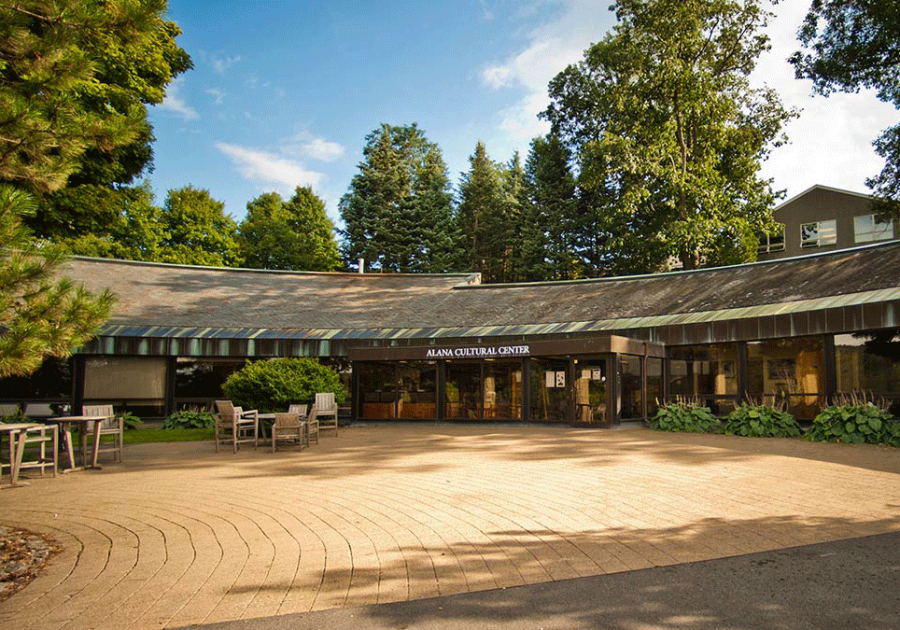ALANA Cultural Center Celebrates 30th Anniversary
The ALANA Cultural Center celebrated its 30th anniversary with an event including remarks from President Brian Casey and ALANA’s director LeAnna Rice.
The Africana, Latin American, Asian American and Native American (ALANA) Cultural Center hosted a rededication celebration on Wednesday, April 24 to commemorate the center’s 30th year on the Colgate campus. Hors d’oeuvres and a tile-decorating station accompanied the event.
The evening began with remarks from President Brian Casey, the center’s director LeAnna Rice and ALANA Outreach and Programming Coordinator Dayna Campbell ’17.
Before formal remarks began, Rice asked that all in attendance take a moment of silence for the Haudenosaunee people, upon whose land Colgate is built.
Rice, who joined the ALANA team in 2018, then explained that ALANA is a space for community-building and having open dialogues.
“The ALANA Center’s history was long before this building ever started,” Rice said. “It started with students and faculty saying, ‘you know what, we need to do better for our people of color.’”
Following Rice’s introduction, Casey formally kicked off the celebration by discussing the timing of the ALANA center’s birthday in conjunction with Colgate University’s year-long Bicentennial celebration.
“It is fitting that we celebrate this moment in the ALANA Cultural Center’s history at the same time we mark a bicentennial,” Casey said. “These kinds of historic moments are deeply important for universities and those that are a part of it because they allow us to stop for a moment and take stock—look back at the trail that has been followed and where we want to climb to.”
While Casey noted that the achievements of the university in establishing a cultural center, he reminded the audience that its creation did not come easy.
“[We] must also reflect on the history of frustration and setbacks,” Casey said. “Our history reminds us that hopefulness is only earned through hard work and perseverance.”
In 1989, the university constructed its first cultural center building under Colgate President George Langdon.
“Langdon [declared] that the center marked a steadfast commitment to intellectual and cultural diversity,” Casey said.
The name ALANA was first coined at Colgate in 1996.
“[This reflected] a recognition of the specific challenges facing students of African, Latinx, Asian and Native American heritage,” Casey said.
Campbell reflected on her six-year experience at ALANA during the celebration’s opening remarks.
“ALANA quickly become a home away from home. I felt like I could be myself here, and the connections that I have made in and through this place demand just that of me at all times,” she said.
Campbell then discussed the significance of the extent to which ALANA can impact students’ lives and unite communities.
“Although by name, it might appear to some as though we are limited in the scope of support that we offer, the spirit of ALANA goes far beyond ethnic categories. Here, on a very intimate level, I get to see how through our advocacy, we bring communities together to promote learning and understanding, we talk about struggles as well as accomplishments,” Campbell said. “All of us who work here, play here, learn here and occupy this land are responsible for remembering those who have sacrificed and spoken up in support of a dream of what [ALANA] could have been.”
Senior D’Jonita Cottrell shared her feelings about the rededication event.
“I really enjoyed this ceremony,” Cottrell said. “There were a lot of great people in a fabulous space celebrating an initiative and a group of people that deserve to be celebrated every day. I haven’t been to other events like this in the past, but I didn’t expect a rededication ceremony to be so emotional and heartfelt.”
Cottrell also reflected on the importance of events like this one. “These ceremonies are important because they’re about more than just a building. They’re about history, progress, frustration, struggle, and growth,” she said. “They remind us that we’ve come a long way but still have a long way to go.”
Contact Jake Gomez at [email protected].







